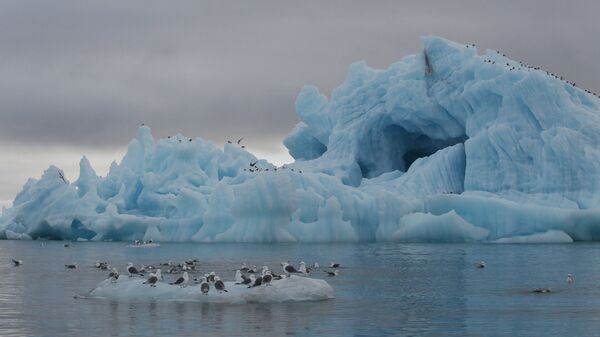Sputnik discussed this with Professor Huw Griffiths, marine biogeographer at the British Antarctic Survey.
Sputnik: How important is this mission to reach this huge iceberg? What's the main purpose of the expedition?
Huw Griffiths: It's really important, because we've had some ice shelves further north collapse in the past, and the soonest we've been able to get into the area is a couple of years later, and by then the environment has always completely changed, whereas this is almost a once in a lifetime opportunity to get in there within a year of the ice moving, so that you can actually get there and see what it was like before the changes started to take place.
Sputnik: What questions are you planning to answer when reaching this iceberg then?
Huw Griffiths: If you imagine these giant ice shelves around Antarctica are a huge area, but nobody really knows what lives underneath them, and this iceberg is a size of well over a million football pitches, so it's a huge area, and we have no idea what lives there. So the first question is, what does the sea floor look like and we'll map it using ecosounders and things like that, but also we'll be looking at what are the animals, what's the chemistry of the water, what sort of bacteria are living there, and also if we can combine with international colleagues to go back in a few years time, we can see what are the changes, and that's really important, because if climate change goes on the way it's being predicted, then this kind of event is likely to happen more often and we can actually start to understand what the impacts of that will be on the environment.
Sputnik: Many researchers have said that the climate change has already affected the seas of Antarctica, how serious was the impact and what consequences can this impact have on the environment?
Huw Griffiths: So these changes that have happened already in Antarctica have been small increases in temperature, but also as it goes on, it's likely to affect the amount of sea ice that we see, which is important for a lot of species, including krill, which is food for many of the animals that people know from Antarctica, like whales and penguins, and seals and that's kind of the main food source for these animals, and it spends its winters living under the sea ice, so if the ice isn't there, there's nowhere for the krill to go and breed and hide from predators during the winter. So it's a massive impact on the sorts of things that people know about, but also the things that we study, the creepy, crawly things at the bottom of the sea, very often they have lots of eyes or no eyes, lots of legs or no legs, sponges, coral — those kind of things, and we don't really know where they are very often, let alone, how they'll be impacted. So this kind of study gets us an idea of knowing what's there, so we can work out what changes will affect it.
READ MORE: Earth Enters New Geologic Era Shaped By Man
Sputnik: Much was reported of the calving of the Larsen C iceberg last year, some scientists have been reluctant to link that calving with global warming, why is that? What is it linked with instead of that then?
Huw Griffiths: These ice shelves are huge floating bits of ice and if you can imagine once they get to a certain size, bits drop off them naturally, otherwise, they would have covered the whole planet by now. So there is the action of the tides, storms, waves, more ice being pushed off the land by glaciers that pushes this ice further out and, eventually, the stresses and strains of trying to keep all that big sheet of ice together, some bits fall off and sometimes the ice self will regrow very quickly and in other times it will take tens of years or decades or even hundreds of years for that ice to reach that point again, but that's a very natural process, everybody is being very cautious because it's very tempting to say that it's a clime change event, but actually icebergs have always existed in Antarctica and the main source of icebergs is the giant floating ice shelves, and you get the really big icebergs from these only, so the small glaciers that feed into the sea directly, won't give you a giant iceberg, but the giant ice shelves will give you the really big famous icebergs.
READ MORE: See the Monsterberg: First Video of Earth's Biggest Iceberg Released
Sputnik: In your view, if everything goes well, what impact can the future findings of this particular expedition give scientists? What will it do in terms of the issue of climate change? What's your particular hope for this particular expedition?
Huw Griffiths: My hope it that we can get there for a start, because there's a lot of sea ice in the Weddell Sea and it's where Shackleton lost his ship, so what I really want is to get there safely, to find out what's living there and to give us a baseline from which we can do good science in trying to understand what these environments are like now and what they can end up like in the future. So really, this is brand new discovery science and that's really exciting, so there can well be new species, whole new environments, and that's the really exciting bit for scientists, things we've never seen before.



